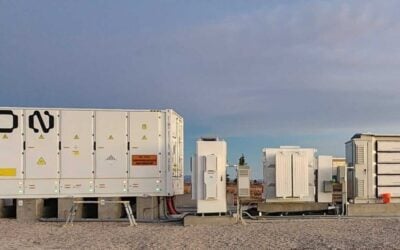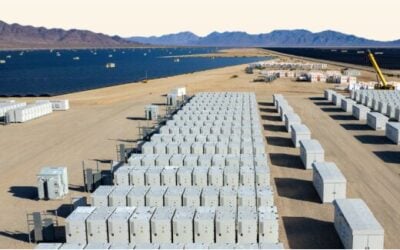Control and monitoring portal for SolarCity’s DemandLogic. Image: SolarCity.
SolarCity and Green Charge have announced two commercial scale energy storage systems in California, one completed and the other yet to be built, which will each save the host over US$100,000 a year in energy costs.
SolarCity has installed its DemandLogic commercial and industrial (C&I) energy storage system at the headquarters of Hydraflow, an engineering specialist for the aerospace and defence industries in Fullerton. The installation combines a 1MW solar PV system with a 250kW / 500kWh battery energy storage system.
Like many commercial energy users in the US, Hydraflow’s HQ is subjected to peak demand charges which mean businesses are billed for their electricity based on the amount drawn from the grid during windows when demand is at its highest. The SolarCity DemandLogic system will be able to store 500kW of solar electricity onsite.
SolarCity claimed Hydraflow is set to save US$3.5 million in energy costs over a 30-year contract using the system, equivalent to around US$117,000 per year. As well as the peak demand charge reduction, the project also offers Hydraflow solar energy at rates lower than it is currently paying for power at utility rates.
Try Premium for just $1
- Full premium access for the first month at only $1
- Converts to an annual rate after 30 days unless cancelled
- Cancel anytime during the trial period
Premium Benefits
- Expert industry analysis and interviews
- Digital access to PV Tech Power journal
- Exclusive event discounts
Or get the full Premium subscription right away
Or continue reading this article for free
In April, SolarCity closed US$150 million of funding for commercial solar-plus-storage projects. Shareholders will vote on a potential SolarCity merger with Tesla on Thursday.
Green Charge project to save US$1.8 million
Similarly, Green Charge’s latest announced project, in Sonoma County, touts savings of US$1.8 million over its first 10 years of operations. The Silicon Valley company is working with solar developer REC Solar to provide a combined solar-plus-storage installation for SOMO Village, a commercial estate with some residential areas, which already has its own solar-powered events space for concerts and gatherings.
While the size of the PV array was not disclosed, Green Charge said it will install 1MW of energy storage. SOMO Village expects to save more than US$160,000 in the first year alone, with the estate thought to consume around 6MW of energy annually. In a press release, Green Charge cited a Rocky Mountain Institute study which said that using storage, commercial enterprises can increase the value of PV self-consumption by about US$25 per kilowatt-year, while peak demand reduction could be worth US$200 per kilowatt-year.
“Solar PV has long been seen as an environmentally responsible energy choice, but many companies now deploy solar with energy storage because it is also a smart business choice. With a combined solar and storage system, the potential savings and return on investment can be much greater than each can provide on a standalone basis,” Green Charge CEO Vic Shao said.





